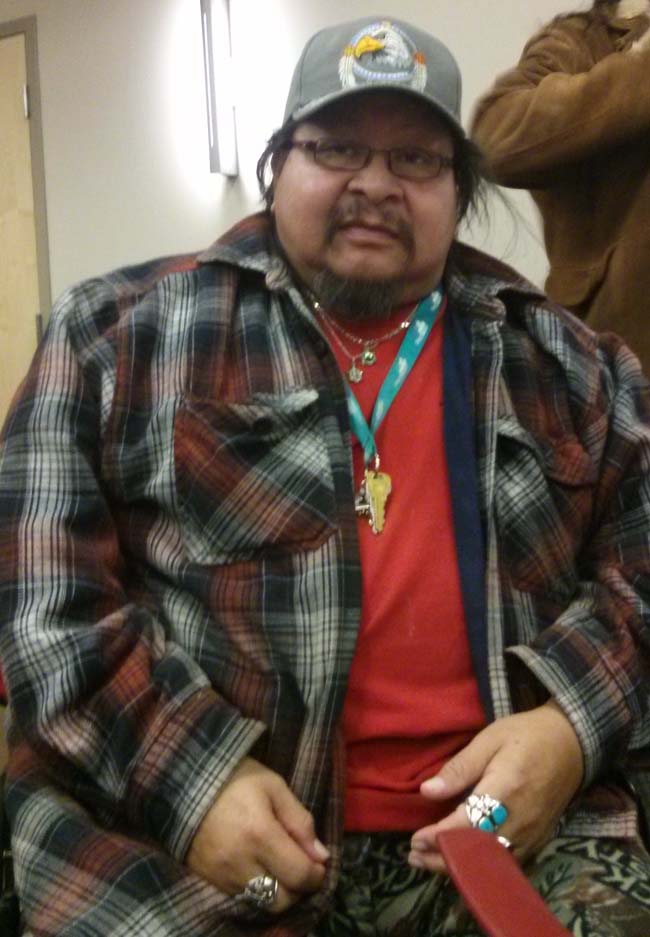Aamjiwnaang battle with Enbridge continues

By Colin Graf
AAMJIWNAANG – When a pipeline company offers a free meal to a First Nations community, people may come away with a full stomach, but a number of residents at Aamjiwnaang came away from such a meal on Jan. 15 with a belly full of suspicion, fear, and anger.
As some citizens unfurled a banner in the meeting room of the community centre attacking Enbridge Pipelines, others spoke of their fears about ruptured pipelines and chemical leaks in this community surrounded by the complex of chemical plants and oil refineries known as the Chemical Valley.
Sharilyn Johnston, Aamjiwnaang’s environment coordinator said that Enbridge officials were scheduled to present information about their maintenance plans and “integrity digs” on the networks of pipelines criss-crossing band territory, including Line 9, which runs along the reserve’s southern edge.
“The digs are conducted by the company to check on the condition of pipe in different locations,” she explained.
Enbridge representatives were unable to attend due to a bomb scare at a Sarnia research park that houses their offices. Johnston said that this made it impossible to get to presentation materials for the evening and she said they hoped to speak with the band another time.
Aamjiwnaang citizens were uncertain of their trust in Enbridge.
“We need the things they (chemical companies) make,” said Mike Plain to some 50 participants. “but why don’t they spend a bit of the billions they make in producing these things in a safe manner? They say they want to be good neighbours, but you’re not being good neighbours by emitting these toxins. It’s like a bully punching you in the face.”
Aamjiwnaang councilor Darren Henry said that council is preparing to negotiate compensation with Enbridge for the company’s continued use of pipelines running in or beside band territory.
“The Impact Benefit Agreement could result in payments to the band or funding for programs,” said Henry. “The council was an intervener in public hearings over Enbridge’s plans to reverse the flow of Line 9 to bring western oil to eastern Canadian refineries, but when the plan was approved, the mayor and councilors decided to ‘further our community’s wishes’ by negotiating rather than spend our resources on legal proceedings. Some members might question if it would be moral to accept money from the company, but whether that’s blood money or not, we have to try and look after our people.”
Graham White, Business Communications Manager for Enbridge said in a statement regarding the negotiating of impact benefit agreements:
Our engagement process requires ensuring we are discharging Crown delegated aspects of consultation as our first priority, and supporting the community to review and understand the project(s) and determine what potential impacts to rights may exist. We make all efforts to address, and mitigate those concerns. Concurrent to that process, we also seek opportunities to involve the respective First Nation in the economics of the project and we also look at ways in which we are able to support community priorities. This is our approach, in some cases we have formulated agreements that address these elements, but in all cases this is the approach we take.
Residents were also invited to pick up emergency “starter kits”, sponsored by Sarnia-area industries at the meeting. The kits, featuring battery-powered radios, emergency lights, hand warmers, first aid kits, and water purification tablets, are designed to help families start preparing for an emergency, whether industrial or natural.
Aamjiwnaang citizen Raecine Johnson says that the kit is a good idea, but it may not be enough to help people living right in the shadow of the plants.
“We’ve had emergencies when we didn’t know what was happening,” said Johnson.
She and her neighbours had to contend with a flame from a flare stack at the Suncor refinery right behind their home three years ago that turned sideways for four blocks, spawning “black tornadoes” in the air.
“It was so close we could feel the heat, and the police couldn’t tell us that anything was happening,” Johnson remembered.


